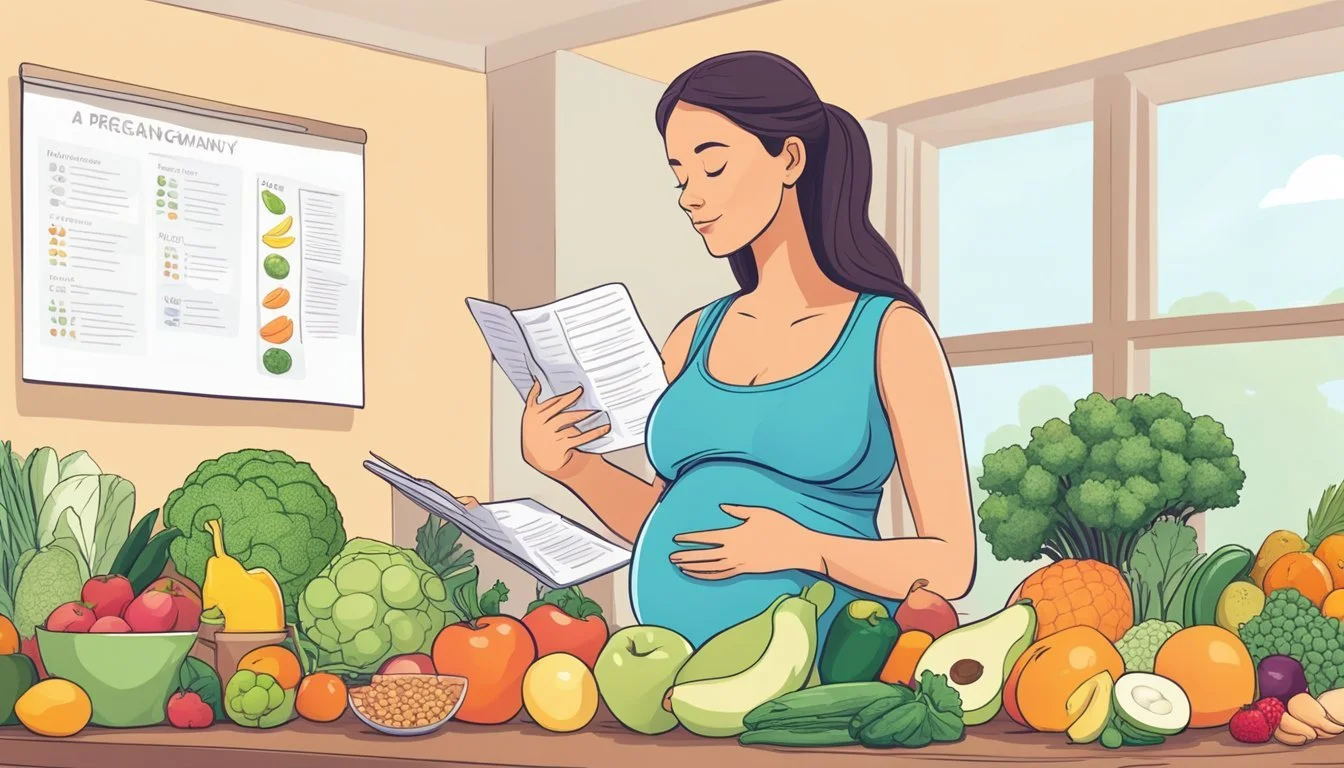Is It Safe to Follow a Low-Carb Diet During Pregnancy?
Understanding the Risks and Guidelines
The safety of low-carb diets during pregnancy is a subject of considerable debate among health professionals and expecting parents. A low-carb diet, often exemplified by ketogenic or paleo dietary patterns, focuses on reducing the intake of carbohydrates while emphasizing protein and fat consumption. While non-pregnant individuals may adopt such a diet for various health benefits or weight loss, the altered nutritional needs of pregnant women require careful examination to ensure both the mother's and the baby's well-being.
Nutrients play critical roles during pregnancy, supporting the development of the fetus and maintaining the health of the mother. Carbohydrates provide essential energy for both, and certain carbohydrate-rich foods are primary sources of dietary fiber, B vitamins, and minerals—all crucial for a healthy pregnancy. However, concerns have been raised regarding the presence of ketones in the urine of pregnant women on a low-carb diet and the potential risks such as pregnant women avoiding necessary nutrients found in carbohydrate-rich foods.
Given these concerns, health experts caution against restrictive or weight-loss focused diets during pregnancy, advising instead on balanced nutrition that can accommodate the increased needs for specific vitamins and minerals. A low-carb diet while pregnant may result in inadequate intake of folic acid, which is important for fetal brain and spine development, and may affect the baby's growth. Understanding these dietary impacts is crucial for ensuring the health of both mother and child.
Low-Carb Diet Fundamentals
The foundation of a low-carb diet is the reduction of carbohydrate intake to encourage the body to burn fat for fuel. This dietary strategy is often accompanied by a higher consumption of proteins and fats.
What Is a Low-Carb Diet?
A low-carb diet typically involves significantly reducing the amount of carbohydrates one consumes. Instead of deriving most of the body's energy from carbs, individuals on this diet obtain calories from protein and fat. The goal is to enter a state called ketosis, where the body becomes highly efficient at burning fat for energy.
Types of Low-Carb Diets
Ketogenic Diet: This is a strict low-carb diet that requires limiting carb intake to about 20-50 grams per day. The diet primarily includes high-fat foods and is designed to induce ketosis.
Standard Ketogenic Diet (SKD): Typically contains 75% fat, 20% protein, and only 5% carbs.
Cyclical Ketogenic Diet (CKD): Includes periods of higher-carb refeeds, such as 5 ketogenic days followed by 2 high-carb days.
Targeted Ketogenic Diet (TKD): Allows adding carbs around workouts.
Other Low-Carb Diets: Not all low-carb diets are as restrictive as the ketogenic diet. Some might simply reduce the amount of carbohydrate intake without targeting the ketosis state.
Atkins Diet: Focuses on controlling the levels of insulin in the body through a low-carbohydrate diet.
Low-Carb, High-Fat (LCHF): Emphasizes consuming more fats and fewer carbs without counting calories too strictly.
Effects of Low-Carb Diets on Pregnancy
The impact of low-carb diets during pregnancy is significant due to the potential influence on the developing fetus and the nutritional needs of the pregnant individual. Addressing the balance of nutrients and the effects of ketosis are critical components when considering such a diet.
Nutritional Concerns During Pregnancy
A low-carb diet often raises concerns regarding sufficient nutrient intake for both the pregnant individual and the baby. The primary nutrients at risk include:
Vitamins: Essential vitamins like Vitamin D, B6, B12, and folic acid are critical for fetal development and may be deficient in low-carb diets.
Folic Acid: Integral to brain and spine development, folic acid is found in higher amounts in carbohydrate-rich foods.
Fiber: Generally obtained from fruits, vegetables, and whole grains, fiber is often lacking in low-carb diets and is vital for digestive health.
It is crucial to monitor nutritional intake, as deficits in these areas can impact both maternal health and fetal development.
Ketosis and Fetal Development
Ketosis, a state in which the body uses ketones for fuel due to low carbohydrate intake, poses specific concerns during pregnancy. Investigations suggest that:
Ketones: The presence of ketones in the urine during pregnancy can be alarming and is linked to conditions such as diabetic ketoacidosis and starvation ketosis.
Embryonic Alterations: Research on animals indicates that a ketogenic diet might result in changes in growth rates and organ development in embryos, potentially leading to future dysfunctions.
Because of the reliance on ketones, a low-carb diet may substantially alter the typical energy sources used during fetal development, though conclusive human data are limited.
Specific Nutrient Needs in Pregnancy
During pregnancy, a woman's body requires an increased intake of specific nutrients to support fetal development and maternal health. The focus should be on a balanced intake of macronutrients and micronutrients to meet these needs.
Macronutrients and Micronutrients
Macronutrients consist of protein, fats, and carbohydrates. Pregnant women need an adequate amount of protein for the growing tissues of the fetus, with recommendations increasing to about 71 grams per day. Fats are also vital, particularly omega-3 fatty acids, which are crucial for the baby’s brain development. However, not all fats are created equal; emphasis should be on healthy fats found in foods such as avocados, nuts, and seeds.
Carbohydrates should come from nutrient-dense sources, including fruits, vegetables, and whole grains, which provide essential vitamins, minerals, and dietary fiber. This helps maintain healthy digestion and provides a gradual release of energy.
The micronutrients of particular importance during pregnancy include iron, calcium, folate, and B vitamins. Iron supports the development of the placenta and fetus and helps prevent anemia. A pregnant woman’s iron needs are about 27 mg per day. Calcium is essential for building strong bones and teeth in the fetus, with the recommended intake being around 1,000 mg per day.
Folate is a B vitamin that is critical in preventing neural tube defects in the developing baby, and it’s recommended that women consume 600 micrograms daily. Additional B vitamins, such as B6 and B12, play a vital role in the development of the baby's nervous system.
Sources of Essential Vitamins and Minerals
To ensure the intake of these nutrients, a varied diet including the following is recommended:
Protein: Lean meats, poultry, fish, eggs, beans, and nuts.
Fruits and Vegetables: A variety of colorful fruits and vegetables to ensure a range of vitamins and minerals.
Iron: Red meat, poultry, seafood, and iron-fortified cereals.
Calcium: Dairy products, fortified plant-based milks, leafy green vegetables.
Folate: Dark green vegetables, beans, peas, nuts, and fortified foods.
Fiber: Whole grains, beans, fruits, and vegetables.
In addition to food sources, prenatal vitamins are often recommended to cover any nutritional gaps. These supplements typically include a combination of essential vitamins and minerals, including folic acid, iron, and calcium, which support the health of both mother and baby. It's generally advised to begin taking a prenatal vitamin at least three months before conception and continue throughout pregnancy.
Potential Risks of a Low-Carb Diet While Pregnant
A low-carb diet during pregnancy can have implications for both the mother's metabolism and the development of the fetus. Careful consideration is required when modifying carbohydrate intake, as it plays a significant role in gestational health and fetal growth.
Effect on Blood Sugar and Gestational Diabetes
A low-carb diet can induce a state called ketosis, where the body uses fat instead of glucose as its primary energy source. This could potentially affect blood sugar levels in pregnant women. While it might seem advantageous for those with gestational diabetes—a condition characterized by high blood sugar during pregnancy—to limit their carb intake, it's crucial that any changes in diet during pregnancy are closely monitored by a healthcare professional. Improper management of blood sugar could lead to complications both for the mother and the developing fetus.
Blood Sugar: Carbohydrates are the body's primary source of glucose, crucial for both maternal energy and fetal development.
Gestational Diabetes: Can be managed with a balanced diet; however, extreme carb restriction is not typically recommended.
Impact on Weight Gain and Fetal Growth
The maternal diet directly affects weight gain during pregnancy. Adequate weight gain is essential for fetal growth, but excessive weight gain can lead to complications such as premature birth. On the other hand, insufficient intake of carbohydrates can potentially result in inadequate weight gain, which may compromise fetal development. Carbohydrates should not be eliminated entirely, as they are necessary for the energy needs of both mother and fetus.
Weight Gain: Should be monitored to ensure it is within the recommended range for a healthy pregnancy.
Fetal Growth: Adequate nutrition, including sufficient carbohydrates, is vital for the proper development of the fetus.
Health Considerations and Precautions
When considering a low-carb diet during pregnancy, the primary concern is to ensure the health and safety of both mother and child. Taking into account the changing nutritional needs of the body during this period is crucial.
Consultation with Healthcare Professionals
Before beginning or continuing a low-carb diet during pregnancy, it is imperative for an expectant mother to consult with healthcare professionals, such as a doctor, nutritionist, midwife, or dietitian. These experts can provide personalized advice, taking into account the individual's medical history and dietary needs. They are trained to identify potential risks and can help balance the diet to support fetal development while considering the mother's health.
Monitoring and Adjustments During Pregnancy
Careful monitoring of the mother’s and fetus's well-being is essential when adhering to a restrictive diet. Healthcare professionals should regularly check:
Blood sugar levels: To ensure they remain within a healthy range, as they can be affected by carbohydrate intake.
Ketones: High levels of ketones can be a sign that the body is using fat for energy due to insufficient carbohydrate consumption. Monitoring for ketones helps to avoid ketosis, which is not typically recommended during pregnancy.
Adjustments to the diet may be required as pregnancy progresses. It is crucial to provide adequate nutrients and energy for the developing fetus. If prescribed by a healthcare professional, these adjustments may include:
Increasing carbohydrate intake if levels are too low.
Adding nutrient-dense foods to ensure all vitamin and mineral requirements are met.
Throughout pregnancy, the focus should always remain on maintaining a balanced intake of all essential nutrients to support both the mother's and baby's health.
Alternatives to a Strict Low-Carb Diet
In considering a diet during pregnancy, alternatives to a strict low-carb diet can offer the necessary nutrients for both the mother and the developing baby. These alternatives focus on balance and inclusion of various food groups.
Balanced Diet Approach
A balanced diet emphasizes the inclusion of all food groups, providing a variety of nutrients essential for prenatal development. Pregnant individuals should aim for a diet that incorporates adequate amounts of protein, healthy fats, and carbohydrates. The diet should be rich in:
Whole grains: A source of essential B-vitamins and iron.
Legumes: Including beans and lentils, which provide protein, fiber, and various minerals.
Fruits and vegetables: Offering a wide range of vitamins, minerals, and antioxidants.
This approach supports a moderated intake of carbohydrates while ensuring that critical nutrients are not compromised.
Inclusion of Complex Carbohydrates
Complex carbohydrates are vital during pregnancy due to their high fiber content and slower digestion, which can help maintain steady blood sugar levels. Good choices include:
Whole grain breads and cereals
Brown rice or quinoa
Sweet potatoes
Pregnant individuals should incorporate these complex carbohydrates into their meals, focusing on those that are nutrient-dense to support fetal growth and provide sustained energy.
Exercise and Lifestyle During a Low-Carb Pregnancy
Adopting a low-carb diet during pregnancy can require adjustments to exercise and lifestyle to ensure both mother and baby remain healthy. Proper exercise routines and managing energy levels become critical components of a pregnant woman’s routine when carbohydrates are limited.
Safe Exercise Routines
Pregnant women should focus on low-impact, moderate-intensity exercises that maintain fitness without overstraining. Activities such as walking, swimming, prenatal yoga, and light resistance training can be beneficial. They should aim for at least 150 minutes of moderate-intensity exercise each week, as recommended by health professionals. It is important for expecting mothers to consult their healthcare provider before starting any new exercise program, especially when following a low-carb diet which may affect energy levels.
Walking: Can be done for 30 minutes daily.
Swimming: Recommended twice a week for 20-30 minutes.
Prenatal yoga: Can help with stretching and relaxation, safe to practice multiple times per week.
Light resistance training: Keeps muscles toned, using light weights and avoiding heavy lifting.
Managing Energy Levels and Fatigue
On a low-carb diet, pregnant women might experience fluctuations in their energy levels due to reduced carbohydrate intake. To combat tiredness, they should focus on:
Adequate hydration: Drink at least 8-10 glasses of water daily.
Rest: Ensure 7-9 hours of sleep per night and take short, frequent breaks throughout the day.
Nutrient-dense foods: Emphasize high-quality proteins, healthy fats, and micronutrients to sustain energy.
Snacking: Small, frequent snacks can help maintain blood sugar levels and prevent energy dips.
It is vital for women to listen to their bodies and adjust their activity levels accordingly. Energy levels can serve as a guide for exercise intensity and duration. If they experience ongoing fatigue, they should seek guidance from their healthcare provider to ensure their diet is properly supporting their pregnancy.
Special Considerations for Pregnancy Diets
When designing a diet for pregnancy, one must carefully evaluate nutritional intake to ensure both maternal health and fetal development. A diet should provide an array of vitamins and minerals, taking into account the dietary restrictions and preferences such as vegetarianism or veganism, and should also help manage common pregnancy symptoms.
Vegetarian and Vegan Low-Carb Options
For pregnant vegetarians and vegans following a low-carb diet, it is essential to include diverse sources of protein and nutrients typically found in animal products. Eggs and dairy products for vegetarians, and nuts, seeds, beans, and soy products for vegans, can fill this role effectively. A variety of vegetables, such as leafy greens, should be consumed to meet micronutrient requirements. Inclusion of low-carb fruits like berries can provide additional fiber and vitamins.
Protein sources: beans, lentils, tofu, tempeh, nuts, seeds, eggs (for vegetarians)
Calcium sources: broccoli, kale, fortified plant-based milk
Iron sources: spinach, lentils, fortified cereals
Essential fatty acids: chia seeds, flaxseeds, walnuts
It is important for those on a vegetarian or vegan diet to monitor and possibly supplement for nutrients commonly found in animal products, such as Vitamin B12, iron, and omega-3 fatty acids.
Addressing Common Pregnancy Symptoms with Diet
Diet can play a significant role in managing common pregnancy symptoms such as constipation and nausea. High-fiber foods like vegetables and flaxseeds can help prevent constipation. Nausea can be alleviated by snacking on small, frequent meals throughout the day and including foods that are easy on the stomach.
For constipation:
High fiber: vegetables (e.g., spinach, broccoli), chia seeds, ground flaxseeds
Hydration: ample water intake, flavored with a squeeze of lemon or lime for palatability
For nausea:
Gentle on the stomach: plain toast, crackers, ginger tea
Small, frequent meals: avoid an empty stomach, which can worsen nausea
Foods rich in Vitamin B6, such as fish and nuts, have been noted to help with pregnancy-induced nausea. While these dietary adjustments may assist many, pregnant individuals should always consult with a healthcare provider regarding their specific nutritional needs and symptom management.
Conclusion
Low-carb diets, such as ketogenic plans, are a subject of debate among health experts when it comes to pregnancy. Nutritionists emphasize the importance of balanced nutrient intake during pregnancy, for both the mother's and the baby's well-being. While some studies suggest low-carb diets may be safe and beneficial for certain conditions in pregnant women, these are specific instances and should not be generalized.
Key Points to Consider:
Nutrient Intake: Adequate intake of vital nutrients like folic acid, which is essential for fetal brain and spine development, and found predominantly in carbohydrate-rich foods.
Doctor's Consultation: It is crucial for pregnant women to consult healthcare providers before making significant dietary changes.
Expert Guidelines: Most health authorities advocate for a diet that includes a variety of food groups during pregnancy, ensuring sufficient vitamins and minerals are consumed.
In practice, the safety of a low-carb diet during pregnancy rests on individual health status and should be personalized. A thorough assessment by a medical professional is essential to determine if the benefits outweigh the potential risks.
Consideration Recommendation Nutrient Sufficiency Ensure all micronutrient needs are met. Medical Supervision Seek regular advice from healthcare professionals. Diet Modification Adjust as needed to support fetal development.
Ultimately, pregnancy is a sensitive period that necessitates heightened attention to dietary decisions. The mother's dietary practices need to support the comprehensive developmental needs of the fetus, and thus, any dietary regimen should be approached with caution and under professional guidance.





